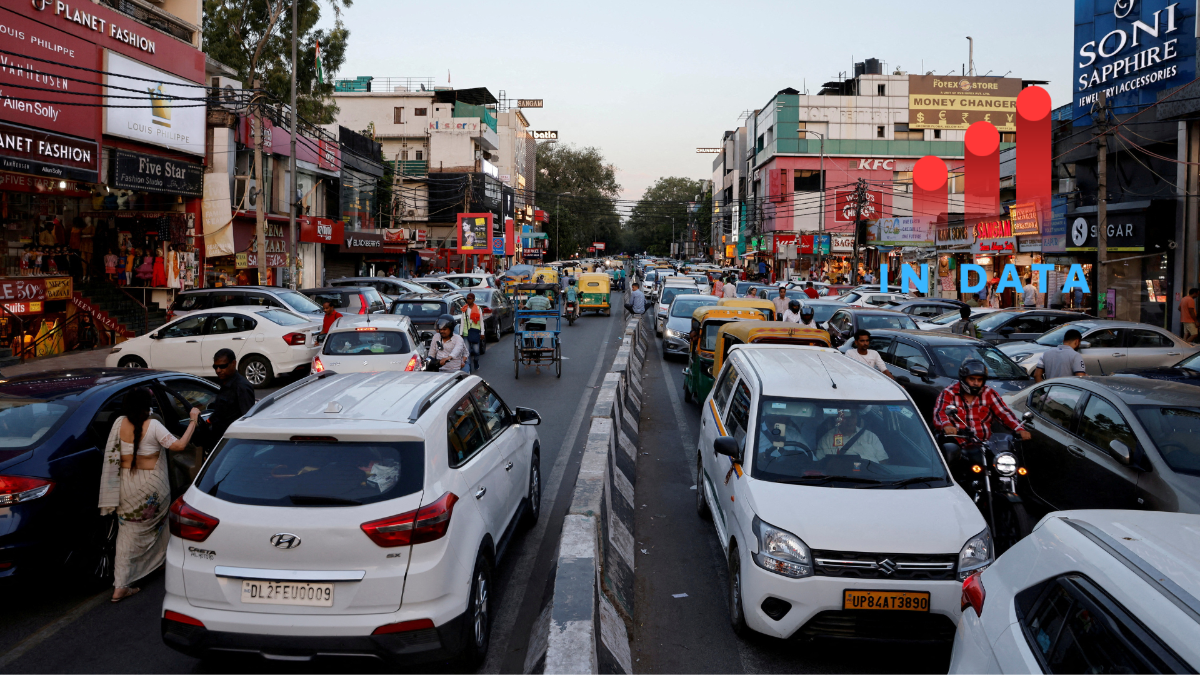Bhasker Tripathi
Published: 1 hours and 18 mins ago
Traffic is seen on a street in New Delhi, India, September 5, 2023. REUTERS/Adnan Abidi
As India accelerates the supply of 20% ethanol-blended petrol, most new cars and bikes are not compliant.
NEW DELHI – Only some 20% of new petrol vehicles sold in India in the last 15 years are compliant with petrol blended with 20% ethanol (E20), analysis of government and industry data shows.
India’s government is pushing for a rapid rollout of E20 and said in July it had reached its goal of selling the fuel five years ahead of schedule, replacing the existing 10% blend.
E20 is now the most common fuel in many regions, but there are no official notices at the pumps to tell drivers what blend of fuel they are putting into their cars and motorbikes.
Indian consumers complain the new fuel mix damages their engines and reduces their mileage.
The programme aims to cut oil imports and emissions by blending petrol with ethanol made from crops like sugarcane and maize. India’s shift from 1.5% ethanol in 2014 to 20% in 2025 is among the fastest in the world.
India’s transport minister has rejected concerns and blamed what he called the petrol lobby for stoking fears. The Ministry of Petroleum and Natural Gas said E20 does not affect insurance or cause engine damage, though mileage may dip slightly.
Petrol vehicles sold in India have a lifespan of 15 years before they have to be re-registered or scrapped.
Most Indian automakers have only been producing E20-complaint vehicles since April 2023, leaving most older cars and two-wheelers unfit for the fuel.
Imported vehicles make up only between 3% and 5% of those sold in India.
More than 250 million new vehicles were sold in India between 2011 and 2023, before the E20 complaint vehicle mandate kicked in, according to the Society of Indian Automobile Manufacturers (SIAM), an industry body of major automakers.
Petrol-driven two-wheelers and passenger cars sold in that period make up most of today’s fleet. While all bikes run on petrol, auto experts say about 30% of the cars are diesel.
That means 234 million, more than 80% of the vehicles sold between 2011 and 2025, run on petrol and are only complaint with 5% and 10% ethanol blends.
That means only 20% of petrol vehicles sold in India in the last 15 years were made to be compatible with E20 fuel.
The figure shows the transition to E20 has left most owners behind, leaving many questioning the potential impact on maintenance costs, warranty and insurance coverage.
So far, only Maruti Suzuki has promised to launch an E20 upgrade kit for its cars, costing up to 7,000 rupees ($79).
In an August survey of 36,000 vehicle owners, the polling firm LocalCircles found 66% opposed the roll-out, with 44% seeking withdrawal and 22% asking for more fuel options.
India’s Supreme Court this month quashed public interest litigation demanding more fuel choices be available.
Biofuels are central to India’s plans to cut greenhouse gas emissions and oil import costs.
In just over 11 years, the percentage of ethanol in petrol has risen by 13 times, from 1.5% in 2014 to 20% in 2025.
The government says this has saved 1.06 trillion rupees ($12.11 billion) in crude oil imports and avoided 54.4 million tonnes of carbon emissions over the decade, equivalent to emissions from 12 million petrol cars a year.
But the gains come with trade-offs. Sugarcane, maize and rice production is increasingly being used to make fuel rather than feed people and livestock.
The farming and processing of crops to make ethanol can also generate more harmful emissions than it saves.
($1 = 88.1620 Indian rupees)
(Reporting by Bhasker Tripathi; Editing by Jon Hemming.)
Context is powered by the Thomson Reuters Foundation Newsroom.
Our Standards: Thomson Reuters Trust PrinciplesThese links open on reuters.com
By providing your email, you agree to our Privacy Policy.
The future of food is female: this must be clear at UNGA80
Urban Company IPO leaves gig workers fearing tougher conditions
Environmental crime worth billions is climate fight’s blind spot
Why LGBTQ+ Americans struggle to find asylum in Europe
What does a Donald Trump presidency mean for LGBTQ+ rights?
Q&A: How fashion brands can help suppliers go green
The future of food is female: this must be clear at UNGA80
Urban Company IPO leaves gig workers fearing tougher conditions
Environmental crime worth billions is climate fight’s blind spot
Why LGBTQ+ Americans struggle to find asylum in Europe
What does a Donald Trump presidency mean for LGBTQ+ rights?
Context is a media platform created by the Thomson Reuters Foundation. We provide news and analysis that contextualises how critical issues and events affect ordinary people, society and the environment. Find out more.
The Workforce Disclosure Initiative is an investor-backed project to improve the quantity & quality of corporate workforce data, via an annual survey & engagement process.
Trust Conference is the Thomson Reuters Foundation’s flagship annual event, taking place in the heart of London each year.
TrustLaw is the Thomson Reuters Foundation’s global pro bono service, facilitating free legal assistance to NGOs and social enterprises around the world.











